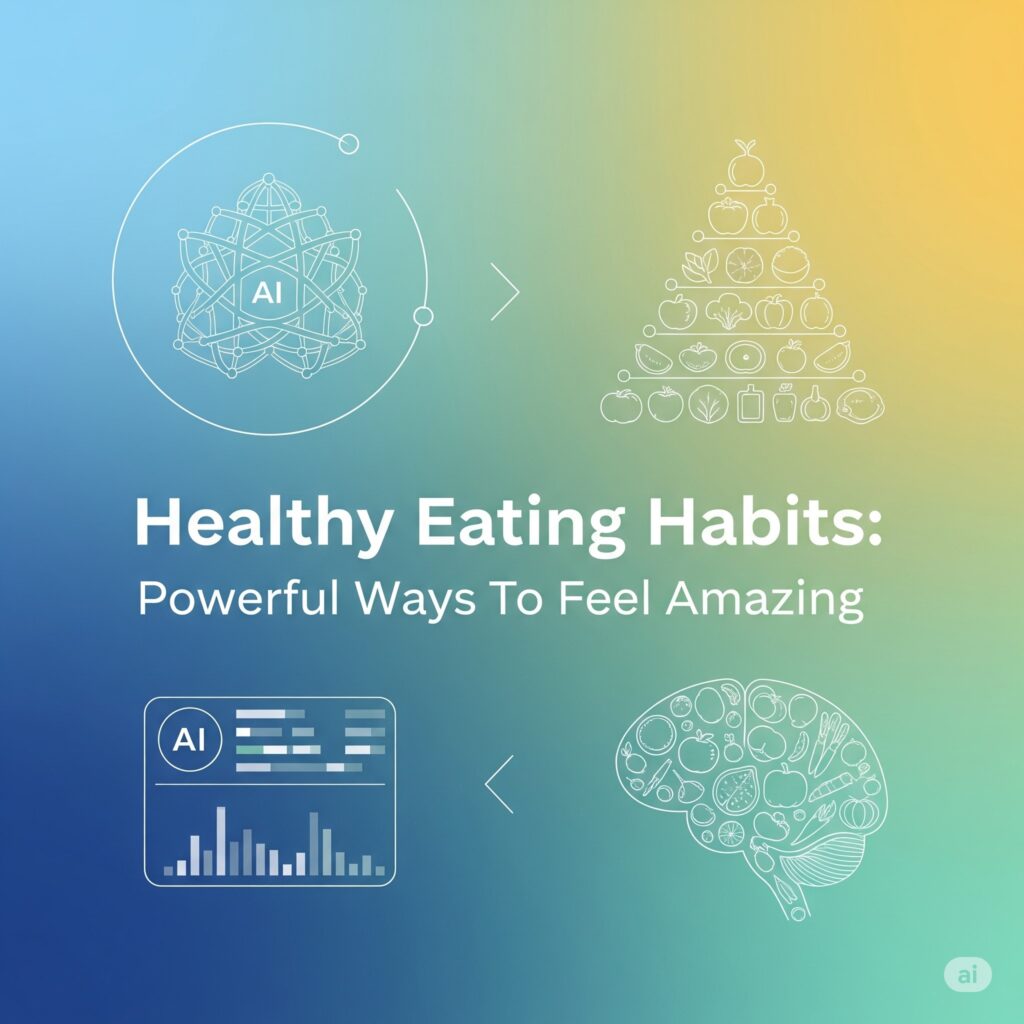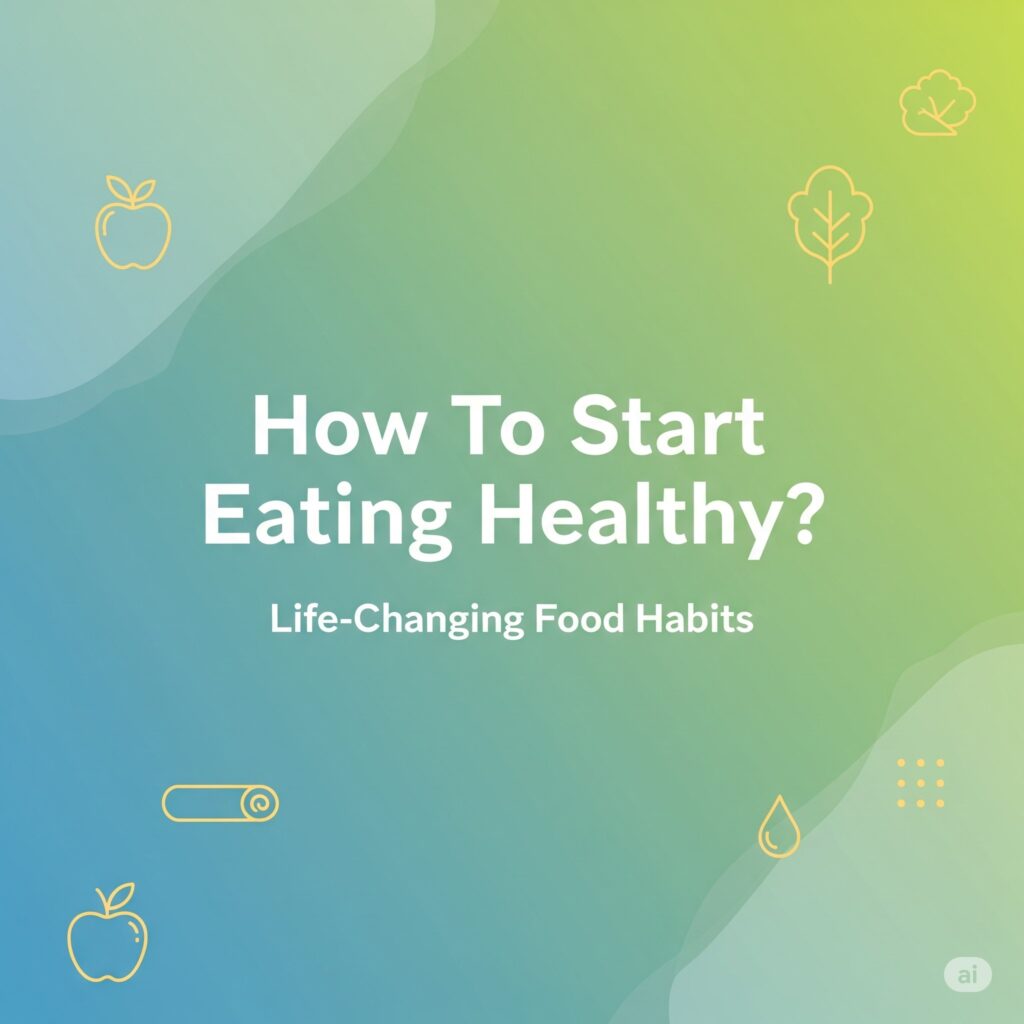Boost your energy, focus better, and feel great every day—these simple healthy eating habits can actually fit your student life without feeling like a chore.
Whether you’re a student juggling classes or just figuring out life, what you eat plays a big role in how you feel. That’s where healthy eating come in.
They’re all about making smart food choices that support your body and brain. It’s not about strict diets or cutting out your favorite snacks. Instead, it’s about balance—getting enough nutrients, staying full longer, and feeling more energized during the day.
Healthy eating habits matter because they help with focus, mood, and even sleep. Plus, starting these habits early makes it easier to stick with them long-term.
In this blog, you’ll learn how healthy eating habits can fit into your busy student life—without making things harder. Let’s get into it!
Table of contents
- How to build healthy eating habits with apps?
- How to use AI tools for tracking healthy eating habits?
- How to improve healthy eating habits with smart gadgets?
- How to automate healthy eating habits using AI routines
- How to plan healthy eating habits with AI assistance
- Benefits of tracking healthy eating habits with tech
- Why wearable tech boosts healthy eating habits?
- How AI diet coaches support healthy eating habits?
- Using machine learning to enhance healthy eating habits
- Best AI apps to improve healthy eating habits
- FAQs: Healthy eating habits
- Conclusion
How to build healthy eating habits with apps?
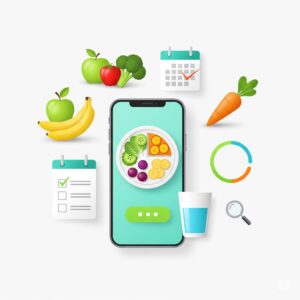
Start your healthy routine with just a few taps. Building healthy eating habits doesn’t have to be hard. Today, apps make it simple and even fun. If you’re a student juggling classes, social life, and maybe even a side hustle, these tools can help you eat better without stress.
Use meal tracking apps to stay aware
Apps like MyFitnessPal or Yazio help you track what you eat each day. Just snap a photo or log your meals, and you’ll instantly see your calories, nutrients, and patterns. This small habit gives you control and shows you where to improve. Over time, this awareness helps build strong healthy eating habits that actually stick.
Set smart goals with AI-powered apps
AI apps like Lifesum or Ate let you set personal goals. Want to cut back on sugar? Eat more veggies? These apps create a plan and cheer you on. Some even suggest what to eat next based on your activity and mood. It’s like having a health coach in your pocket helping you build better healthy eating habits every day.
Get reminders and meal ideas Healthy eating habits
Many apps send reminders to drink water, plan your next meal, or avoid skipping breakfast. Plus, they give you recipe ideas that fit your goals and schedule. This makes it easier to stay on track, even during exams or busy days. Little nudges like these help you form lasting healthy eating without thinking too hard.
Using the right apps makes healthy choices feel easy. Try one or two, track how you feel, and watch your eating habits change without pressure.
How to use AI tools for tracking healthy eating habits?
Let smart tech make your meals healthier, one step at a time. AI tools are changing the way we eat. If you’re someone who forgets meals, skips breakfast, or doesn’t know what’s healthy anymore—don’t worry. Smart apps and tools can help you build better healthy eating habits without the guesswork.
Try food recognition and tracking apps
Some AI apps like Bitesnap or Calorie Mama use your phone’s camera to scan your meals. You take a picture, and the app tells you what’s in your food—calories, fat, carbs, and more. This makes it super easy to stay aware without manually logging every ingredient. Over time, this helps you understand your food better and build healthy eating habits you can trust.
Let AI suggest better food options
Apps like Suggestic or Lumen analyze your habits and recommend smarter food choices. They look at your preferences, activity levels, and even your past meals. Then, they suggest what to eat next. No more staring at the fridge confused. These tools are designed to guide you toward smarter meals and long-term healthy eating habits.
Stay on track with real-time feedback
Some AI tools can even warn you when you’re off track. They send quick updates if your diet lacks nutrients or if you’re going over limits. These instant tips keep you focused without making it feel like a chore. It’s like having a personal coach in your pocket.
AI tools aren’t just for tech lovers—they’re for anyone who wants to eat smarter and feel better. Start small, explore what works for you, and let AI support your journey toward healthy eating.
How to improve healthy eating habits with smart gadgets?
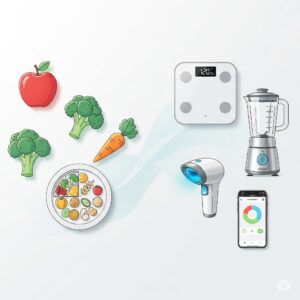
Use tech tools that fit your daily routine and help you eat better. Smart gadgets are more than just cool devices—they can actually help you eat healthier. For students who are always on the go, these tools make healthy choices easier and more consistent.
Use smart scales for portion control
Smart kitchen scales like Renpho or Etekcity connect to your phone and show real-time nutritional info as you weigh food. They help you avoid guessing and give exact calorie and nutrient counts. This makes it easier to manage portions and stick to healthy eating habits every day.
Try smart water bottles to stay hydrated
Hydration is a big part of eating well. Gadgets like HidrateSpark track how much water you drink and light up when it’s time for a sip. Staying hydrated supports digestion and helps you avoid confusing thirst with hunger—both important for building better healthy eating habits.
Wear fitness trackers that monitor your diet
Smartwatches like Fitbit or Apple Watch often include food logging, heart rate tracking, and movement reminders. Some even track your stress and sleep levels, which are linked to food choices. These gadgets keep your lifestyle balanced, making it easier to stick with healthy eating long term.
If you’re trying to upgrade your diet, these tools can give you the push you need. They’re simple to use, easy to carry, and fit right into a student’s busy life. Give one a try and see how tech can improve the way you eat.
How to automate healthy eating habits using AI routines
Let AI do the planning while you focus on living. Balancing school, social life, and meals can be tricky. That’s where AI routines come in. They take care of the planning so you can build better healthy eating habits without overthinking every meal.
Set daily food goals with smart planners Healthy eating habits
AI tools like Lifesum or MyDietCoach help you set daily goals based on your health data. You just input your weight, activity level, and goals—then the app creates a personalized routine. It tracks what you eat, suggests recipes, and reminds you when it’s time to eat. This keeps your healthy eating habits on track, even during your busiest days.
Use voice assistants for meal reminders
Smart speakers like Alexa or Google Assistant can be part of your routine too. You can set reminders like “Time for lunch” or “Drink water now.” These voice prompts keep your meals consistent and prevent skipped meals or late-night snacking. It’s an easy way to stick with your healthy eating without checking your phone all the time.
Let AI learn and adapt to your schedule
Some AI apps get smarter the more you use them. They notice when you usually eat or skip meals and adjust reminders to match. Over time, your eating routine becomes automatic—without stress or strict rules.
AI routines make it easier to stay consistent. And when healthy choices become part of your daily flow, sticking to them feels effortless. Let tech handle the details while you build a healthier lifestyle, one routine at a time.
How to plan healthy eating habits with AI assistance
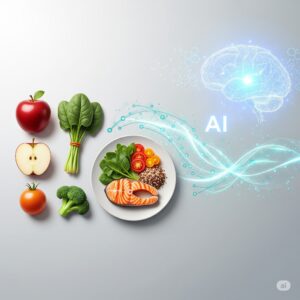
Let smart tools help you make better meal choices. Planning what to eat every day can feel like a lot. But with AI assistance, you don’t have to figure it all out alone. These tools help you create simple, realistic meal plans that match your lifestyle—and help you stick to your healthy eating habits.
Use AI meal planners for daily structure
Apps like Eat This Much or Forks Over Knives use AI to build personalized meal plans. You enter your food preferences, health goals, and budget, and the app creates a weekly plan. It even gives you a grocery list. This makes it super easy to follow your healthy eating habits without worrying about what to cook next.
Adjust plans based on your mood and schedule
AI tools don’t just stick to a fixed routine. Some apps adjust based on your energy levels or mood. If you’re tired or busy, they’ll suggest quick, healthy meals instead of complex recipes. This flexibility keeps your healthy eating habits realistic, even on tough days.
Stay motivated with progress tracking
Many AI tools track your progress and give simple feedback. They might say, “Great job staying on track this week!” or suggest small changes. These little boosts help you stay motivated and focused.
With AI assistance, you don’t need to plan everything on your own. Smart tools can take over the hard parts, so you can focus on eating better and feeling your best.
Benefits of tracking healthy eating habits with tech
Tech makes it easier to eat better, one step at a time. Keeping track of what you eat used to feel boring or stressful. But now, with smart tech, it’s quick, easy, and even kind of fun. If you’re a student trying to stay healthy without spending hours thinking about food, tech can help you stick to your healthy eating in a way that actually works.
You become more aware of what you eat
Tracking apps show you everything—calories, nutrients, sugar, and more. You can see patterns like late-night snacking or skipping meals. This helps you notice what’s working and what’s not. When you’re more aware, you’re more likely to improve your healthy eating habits without feeling overwhelmed.
You get instant feedback and support
Smart tech gives real-time updates. Ate too much sugar? It lets you know. Drank enough water? It celebrates you! These quick responses help you stay motivated and make better choices throughout the day. It’s like having a coach that keeps your healthy eating habits in check without judging you.
You can track progress and feel proud
Watching your progress builds confidence. You see your small wins—like more veggies or fewer energy drinks. That feels good and keeps you going. Plus, most apps show weekly reports, so you can look back and see how far you’ve come.
Tech takes the guesswork out of eating right. It’s fast, personal, and fits into your life—whether you’re at school, work, or home. Start tracking and see how your healthy choices add up.
Why wearable tech boosts healthy eating habits?
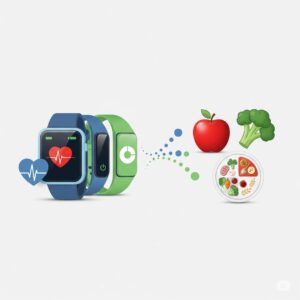
Smart devices on your wrist can help you eat smarter. Wearable tech isn’t just for counting steps. It can actually help you improve your meals and build long-term healthy eating habits. For students who are always on the move, these gadgets make healthy choices easier to track and follow.
Track your activity to match your meals
Wearables like Fitbit, Garmin, or Apple Watch track how active you are. When you see how much you’ve moved, it’s easier to plan your meals around your energy use. For example, if you had a super active day, your device might remind you to fuel up with more protein. This connection between movement and meals supports smarter healthy eating habits.
Get reminders that keep you on schedule
Skipping meals or forgetting to hydrate? Smartwatches can help with that. You can set reminders for lunch, snacks, or even water breaks. These small nudges keep your eating routine balanced and consistent. Following a steady schedule helps strengthen healthy eating without much effort.
Sync food tracking for better insights
Many wearables link to food tracking apps. You can log meals, check your nutrient balance, and get feedback—all from your wrist. Having this data in one place gives you a full picture of your health, making it easier to adjust and improve.
Wearable tech makes staying on top of your diet easier than ever. It fits your daily life and helps you stay mindful of what you eat, all while keeping you moving in the right direction.
How AI diet coaches support healthy eating habits?
Virtual nutrition coaches that fit in your phone. AI diet coaches are like having a personal nutritionist right in your pocket. For students who don’t have time (or money) for meal planning or health advice, these tools offer quick, smart support to build and maintain healthy eating habits.
Get personalized food advice instantly
Apps like Lumen or Senza act as AI diet coaches. They look at your goals, food preferences, and even your energy levels to suggest what to eat next. No more random guessing or skipping meals. With smart suggestions, you’re more likely to stick to your healthy eating habits every day without stress.
Track and adjust based on real-time feedback Healthy eating habits
AI diet coaches don’t just plan your meals—they also learn from your habits. If you skip breakfast or eat too much sugar, they’ll notice and adjust your plan. This feedback helps you catch bad patterns early and get back on track with your healthy eating habits before they slide.
Stay motivated with daily check-ins
Most AI diet coaches check in with you daily. They might send reminders, ask how you feel, or give you a small challenge. This friendly push keeps you thinking about your health and makes it easier to stay consistent, even during busy school days.
With an AI diet coach, healthy eating feels less like a chore and more like a simple routine. You get guidance, support, and flexibility—all in one app.
AI-powered grocery tips to support healthy eating habits
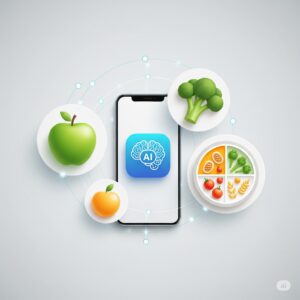
Shop smarter, not harder, with help from AI. Grocery shopping can feel overwhelming—especially when you’re trying to eat healthy on a student budget. That’s where AI-powered tools come in. They help you pick the right items, save time, and stay focused on building healthy eating habits from the start.
Use AI apps to build smart shopping lists
Apps like Yuka or Grocery AI scan your favorite foods and suggest healthier options. They create shopping lists based on your diet goals and even flag processed or high-sugar products. This makes it easy to stick to your healthy eating before you even leave for the store.
Shop by recipe, not impulse
AI meal planning apps often suggest grocery lists based on recipes. If you know what you’re cooking for the week, these tools make sure you buy only what you need. That means fewer unhealthy snacks and more balanced meals—both key to keeping up your healthy eating habits long term.
Compare products and find better deals
Some AI grocery tools also compare prices or nutrition labels. They recommend cost-friendly swaps that still meet your goals. So you can stay healthy without breaking the bank.
With AI-powered grocery tips, you shop with confidence. You get better food, better value, and a routine that supports your healthy lifestyle—right from your cart.
Using machine learning to enhance healthy eating habits
Smarter data, better food choices—made just for you. Machine learning may sound complex, but it’s already helping people eat better. For students who want simple ways to improve their diet, it offers personalized tips based on real habits. That means more accurate support for building long-term healthy eating habits.
Learn from your eating patterns
Apps powered by machine learning, like Suggestic or Foodvisor, track your meals over time. They look for trends—like when you skip breakfast or eat too many late-night snacks. Then, they offer smarter suggestions based on those habits. This targeted feedback helps you adjust and stick with your healthy eating habits in a way that feels natural.
Get custom meal plans that grow with you Healthy eating habits
As you use these apps more, the machine learning models improve. They learn your food preferences, allergies, and daily schedule. That means the more data you give, the better the meal suggestions get. This keeps your healthy eating habits evolving with your lifestyle, not stuck in one routine.
Stay ahead with predictive support
Some apps even predict when you’re likely to overeat or skip meals. They send reminders, tips, or recipe suggestions before you fall off track. That extra support can make a big difference when school or life gets busy.
Machine learning takes the guesswork out of healthy eating. It learns with you, adapts to your needs, and helps you make smarter choices—without the pressure.
Best AI apps to improve healthy eating habits
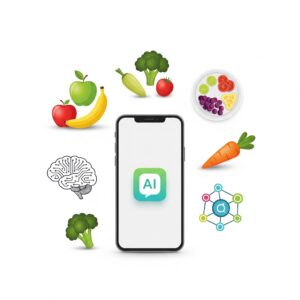
Let smart apps guide you toward better food choices. If you’re a student trying to eat healthier, AI apps can make it way easier. They help you plan meals, track nutrition, and stay consistent. These tools are perfect for busy days when you don’t have time to think about every bite but still want to build strong healthy eating.
Lifesum – Personalized food and fitness guide
Lifesum uses AI to suggest daily meals based on your health goals and preferences. Whether you’re eating vegan, keto, or just want more balance, it adjusts to your style. It also tracks your water intake and gives helpful tips to support your healthy eating habits all day long.
Yazio – Smart meal tracking made easy
Yazio helps you log meals and shows clear nutrition info. It even has recipes and grocery lists based on your calorie and nutrient needs. With easy tracking and clear visuals, it’s a great tool for sticking to healthy eating habits without overthinking every meal.
MyFitnessPal – The all-in-one health tracker
This app combines food tracking, exercise, and progress reports. It scans barcodes and remembers your favorite meals. It’s perfect for anyone who wants a little extra control and daily reminders to eat smarter.
AI apps take the pressure off and turn healthy eating into a habit. Try one or two and see how they fit into your daily life. They’re simple, smart, and made to help you succeed.
FAQs: Healthy eating habits
What are healthy eating habits for students?
Healthy eating habits for students include eating regular meals, avoiding junk food, and drinking plenty of water. Try to add fruits, veggies, whole grains, and proteins to every meal. These simple choices keep your energy up and your brain focused during class.
How can I start healthy eating habits with a busy schedule?
Start small. Pack snacks like nuts or fruit. Plan meals for the week. Use apps to help you prep and shop. Even with a packed day, you can still build healthy eating habits by making quick, smart choices.
Why are healthy eating habits important for students?
They help you stay alert, feel better, and improve your focus. You’ll have more energy and less stress. Building healthy eating habits now also sets you up for a better future.
How do I stop eating junk food all the time?
Start by swapping chips or candy with healthier snacks like popcorn or fruit. Don’t keep junk food where you can easily grab it. Building healthy eating habits means learning to make better choices without giving up everything you like.
Can I eat healthy on a budget?
Yes! Buy fresh produce in season, shop store brands, and cook at home. Oatmeal, rice, eggs, and frozen veggies are affordable and healthy. Healthy eating don’t need to be expensive.
How long does it take to build healthy eating habits?
It depends, but even a few weeks of smart choices can make a big difference. Stay consistent, track your progress, and don’t stress about slip-ups. Over time, healthy eating habits will feel natural.
Conclusion
Healthy eating habits don’t have to be hard. With the right tools and small changes, you can make better choices every day.
Start by using apps, smart gadgets, or even simple reminders. These help you stay on track and build consistent healthy eating habits that fit your lifestyle.
You don’t need to be perfect. Just focus on progress. Every smart food choice adds up and strengthens your healthy eating over time.
The best part? You can do it your way. Find what works for you, and stick with it. Small habits today can lead to big results tomorrow. Your next healthy meal might be the one that changes everything.

